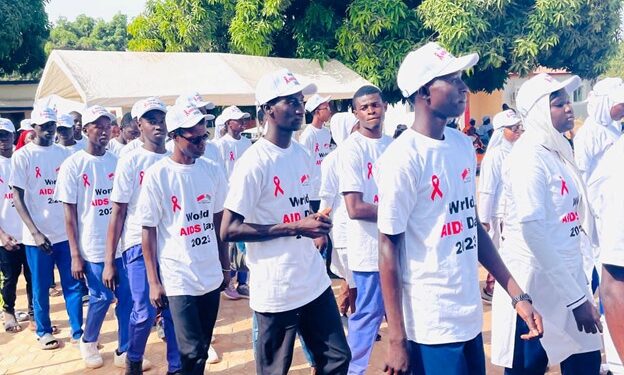The Gambia will today join the rest of the globe to commemorate World Aids Day.
The day is a moment to honour million of lives lost to AIDS; take stock of its response as well as to recommit to ending it by 2030. However, this year’s World Aids Day marks the 34th celebration of the day and the theme is: ‘Equalise’.
At a presser held on Wednesday ahead of the main event at NAS office at FBI Building, Ousman Badjie, the director of National Aids Secretariat (NAS), reminded that this year’s commemoration is special in the sense that the world is four decades into the global response to HIV/AIDS.
“As you may know, it was in1981 when the first cases of HIV/AIDS were reported globally. In The Gambia, we are 36 years since the first case was diagnosed in1986. Yet, we are not able to test each and every Gambian for HIV/AIDS and that’s our wish, as we continue in this response to the disease.”
Badjie revealed that even for those who tested positive, they are not still able to put all on ‘timely treatment’, something that remains a great challenge in fight against the disease. “We commemorate the day by reflecting on the response, but also on the millions of lives lost to AIDS related illnesses.”
He spoke about efforts made towards ending the disease as a public health threat, by addressing health inequalities in communities that have been disproportionately affected by the pandemic.
NAS director hinted that it was on this basic that UNAIDS and partners have chosen ‘Equalise’ as the theme for year’s celebration. “Inequalities are still common as put in efforts in HIV/AIDS response.”
For her part, Sira Horeja Ndow, the country director of UNAIDS, explained that the day is a moment to honour over 40 million lives lost to AIDS, take stock of its response as well as to recommit to ending it by 2030. However, this year’s World Aids Day marks the 34th celebration of the day and the theme for this year’s event is ‘Equalise’.
“As we commemorate 2022 World Aids Day, let’s us remind ourselves that data has shown the current challenges that disunites the world to ending the inequalities holding back the end of Aids such as access to rights and services by adolescent girls and women mainly in sub-Saharan Africa.”
The UNAIDS country director spoke about stigma and discrimination against marginalised people, while also lamenting on the unequal access to resource due to the reduction of investment on health.
She pointed out that in order to end AIDS as a public health threat, people must therefore unite and equalise.
“I therefore join the people living with HIV and communities all around the world to call for action to equalize. We will not end AIDS unless we can end it for everyone and everywhere. We should not be complacent; AIDS is still here and let us work to ending it by 2030.’
Sheriff Badgie from National Aids Control Programme, underscored the importance of the day, saying the day is an important event for people across the globe to unite in the fight in the disease.
“It also allows people to show support and solidarity with those living with the disease.”
He noted that the theme for this year’s event ‘equalise’ serves as a call for action and to work towards actions in addressing inequalities, thereby increasing accessible of services to end stigma of people living with the virus including at marginalize groups.
Mam Kumba Ndow-Sise, Global Fund Project manager Action Aid-The Gambia also spoke at the ceremony.
Source: The Point Newspaper


